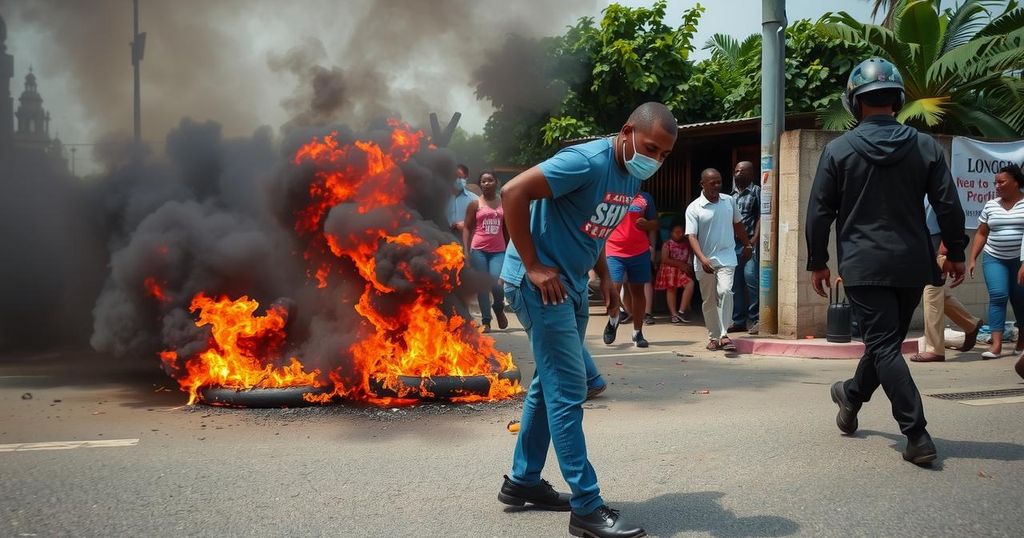Mozambique plunges into chaos following the ruling party Frelimo’s confirmed election victory, leading to violent protests and riots predominantly in Maputo. The death toll has surpassed 278 since October, with significant arrests amid unrest. Prison escapes and widespread vandalism have further escalated the crisis, adversely affecting the economy and prompting thousands to flee the country.
Mozambique is currently facing unprecedented turmoil following the confirmation of the ruling party, Frelimo, as victor in the October 9 elections. This party has maintained power for half a century, and since the announcement, post-election violence has erupted, resulting in extensive urban riots. Reports indicate that in a single week, approximately 176 individuals have tragically lost their lives amidst the unrest.
The chaos has primarily concentrated in the capital, Maputo, where opposition supporters allege electoral fraud and a manipulative election process. The protests against these alleged injustices have escalated into violent riots, prompting government authorities to respond with heavy-handed measures. Local NGO Plataforma recorded that since the beginning of October, the death toll reached 278, with over 4,200 arrests related to the protests.
On Christmas Day, an unprecedented incident occurred as over 1,500 inmates escaped from Maputo’s central prison. Clashes with prison staff led to the deaths of 33 escapees, while around 150 prisoners were recaptured, some reportedly executed. Shockingly, among those still at large include jihadists linked to the ongoing insurgency in Cabo Delgado, further complicating the nation’s security situation.
The unrest has induced widespread fear, with reports of rampant vandalism throughout Maputo. Numerous ambulances, public buildings, and local businesses have been targeted, and essential services have been severely disrupted. Supermarkets and bakeries have ceased operations, leading to scarcity in food supplies, while gas stations are running low due to blocked transport routes.
President Daniel Chapo has publicly urged for peace and unity amidst growing tensions, while opposition leader Venancio Mondlane has criticized the government, alleging that security forces have allowed chaos to prevail as justification for a potential declaration of emergency. Commenting on the electoral process, Mondlane stated, “Our protests target the Constitutional Council, the electoral commission, and Frelimo itself, responsible for the electoral fraud.”
The escalating violence comes after months of political strain, severely impacting Mozambique’s economy, with inflation in basic goods skyrocketing due to supply chain disruptions. Foreign companies have now emerged as new protest targets, reflecting growing opposition sentiments towards foreign involvement in the country’s resources. Roadblocks have further complicated logistics for businesses, leading some to suspend operations.
Internally, the ramifications of the unrest have forced thousands of Mozambicans to flee to neighboring countries. The ongoing violence and economic strain pose a significant challenge to Mozambique’s stability as the nation grapples with the consequences of a sharply divided political landscape.
Mozambique has been under Frelimo’s continued governance for five decades. Following the recent elections, allegations of electoral misconduct surfaced among opposition groups, triggering widespread protests and violent riots. The unrest has seen a dramatic upsurge in fatalities and arrests, creating a profound sense of insecurity within the capital and straining the economy with supply shortages and rising inflation. In addition, the political discord is exacerbated by ongoing security threats from insurgent groups in northern Mozambique.
In summary, Mozambique is enduring a significant crisis following contentious elections resulting in severe political and social unrest. The situation, characterized by violence, fatalities, and mass arrests, presents crucial challenges for national stability. The government faces intense scrutiny regarding its response, as the country grapples with economic hardships stemming from the ongoing turmoil, alongside a wave of internal displacement and an increasing climate of fear among its citizens.
Original Source: international.la-croix.com






